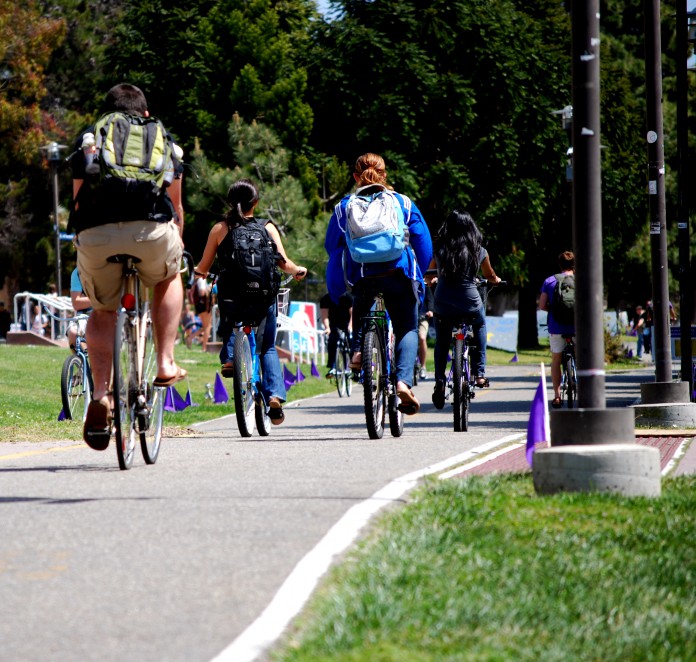David Mendez
On March 10 of this year, UCSB received the Bicycle Friendly Business Gold Award from the League of American Bicyclists. The award recognizes businesses who encourage and facilitate the use of bicycles as a viable means of alternative transportation to and from the work place. While the award is focused primarily on the use of bicycles among employees, the students of UCSB are also recognized as being just as bike friendly.
According to James Wagner, program manager for Transportation Alternatives at UCSB, about 49 percent of the student body commutes by bicycle. With over 10,000 students choosing to bike, it is easy to see why UCSB is the “bikingest campus in the country,” according to Wagner. This is no small feat considering how many students across the country use bikes as their primary method of transportation. Our campus holds this distinction for a number of reasons, one of which is due to the accessibility of bicycle use in the area. There are also many supporters of this method of transportation, who advocate and educate students about the benefits of commuting by bicycle.
First, of course, is the Transportation Alternatives Program (TAP), which seeks to get the word out on more environmentally friendly means of getting around. They offer various benefits, such as carpooling discounts and a few days of complementary parking each quarter for students who bike from at least two miles away.
The AS BIKES committee works to increase student, staff, faculty, and administration awareness and involvement with bicycle system issues around UCSB. So far, BIKES has been able to increase parking availability throughout campus, as well as help finance the design and construction of the bike path throughout UCSB.
A relatively new biking institution here on campus is the AS Bike Shop, which has a dedicated staff that not only repairs bicycles, but also educates people on proper care and maintenance. Run by students for students, the AS Bike Shop offers a very accessible means for students, and even staff, to find help with any bicycle-related problems they may experience.
Each of these organizations helps many of those who already commute in this environmentally friendly way, but they also advocate to those who do not yet use a bicycle, for which there are many reasons to do so.
The most apparent reason is the economic one. It is not difficult to see how much owning a car, let alone taking care of it, can cost you. Bikes are unaffected by rising gas prices, do not require monthly insurance fees, and do not require an expensive permit to park. Upkeep is also much less expensive and, as mentioned before, much more accessible than an auto shop. Bicycles also avoid another very high cost–the cost to the environment.
This is another very obvious advantage, but it is often overlooked. The environmental implications are ignored for the sake of convenience. However, those few minutes you can save getting to school or work may not be worth the lasting effects. A single vehicle burning one gallon of gasoline leads to 20 pounds of carbon dioxide in the Earth’s atmosphere, regardless of efficiency or gas mileage. So while driving a hybrid or another “environmentally friendly” car may seem like a step in the right direction, a bicycle will always be the better choice. Even if the health of your environment is not your main concern, your personal health still has much to gain from two wheels, rather than four.
Improving one’s physical fitness is always a significant advantage. This is especially true when it can come from something you would be doing anyways: getting from point A to point B. Think of how many times you or someone you know has driven to the gym only to get on a stationary bike. Even if you do not have time to go to the gym, simply biking to campus each day will yield benefits in a relatively short amount of time. “I started biking to school and within a couple of months, I already noticed a difference,†said UCSB Cycling Recruiting Director Eric Hartsuyker.
With each of these benefits to be gained, it is important to remember that this does not require an entire lifestyle change. It can be as simple as leaving the house a few minutes earlier to bike to school or, if you currently walk, a few minutes later. If a bike seems like it does not fit in your life right now, Wagner suggests that you “look at what your options are†and “talk to friends who already commute by bike†so you can get a better understanding of what you have to gain.
It is important to take all the factors into consideration when thinking about how to get around, especially since we are fortunate enough to live in an area that is well suited for an eco-friendly method of transportation. Even as ‘bicycle friendly’ as our campus is, it could always be friendlier.
















Comments are closed.